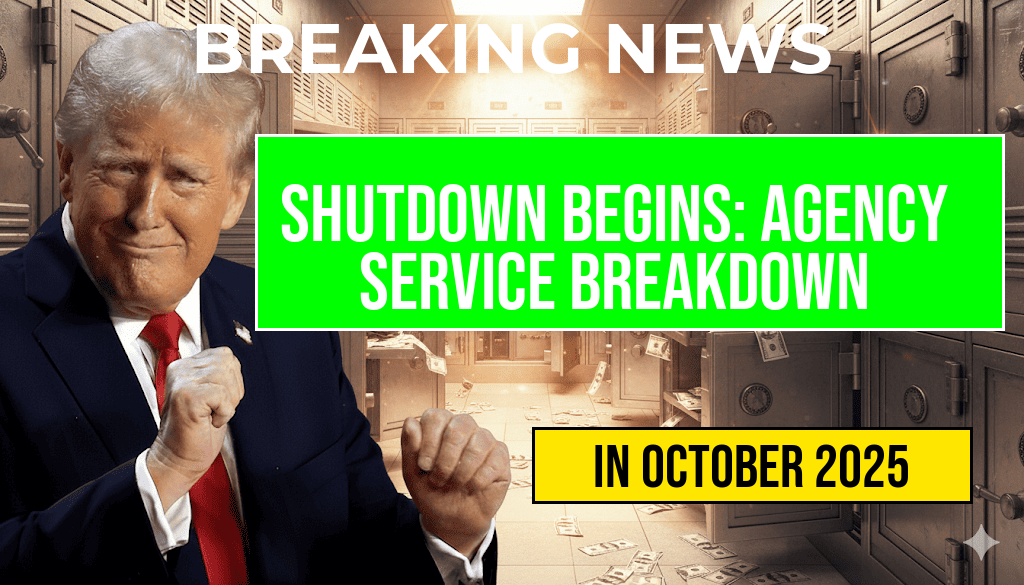The federal government has entered a shutdown phase after congressional negotiations failed to reach a funding agreement by the deadline. As a result, numerous federal agencies have paused non-essential operations, impacting millions of Americans relying on government services. While some agencies continue to operate under essential funding, many others have curtailed services or halted operations entirely. This breakdown provides clarity on which agencies remain operational and which have suspended activities, including critical services such as Social Security, IRS, Defense, and Transportation Security Administration (TSA). The shutdown underscores the complex web of government functions and highlights how federal operations are prioritized during periods of funding gaps.
Impact of the Shutdown: What Remains Open and What Stops
The partial shutdown affects roughly 800,000 federal employees, with many placed on furlough and others working without pay. Agencies tasked with core national security, public safety, and health functions typically continue operations, while programs deemed non-essential are temporarily halted. The following breakdown delineates agency responses and operational statuses during this period.
Social Security Administration (SSA)
- Services Maintained: Most Social Security offices are closed to the public, but essential services continue via phone or online platforms. Social Security remains operational for new claims processing, benefit payments, and urgent inquiries.
- Limitations: In-person visits are unavailable, and some non-urgent administrative tasks are delayed.
Internal Revenue Service (IRS)
- Services Maintained: Critical functions such as processing tax refunds, issuing stimulus payments, and handling taxpayer correspondence continue. The IRS has designated most of its workforce as essential to maintain these operations.
- Services Disrupted: Assistance centers are closed, and in-person audits or face-to-face taxpayer assistance are suspended. Some non-urgent correspondence and audits are delayed.
Defense Department
| Function | Status |
|---|---|
| Active Military Operations | Ongoing |
| Non-Essential Administrative Tasks | Paused |
| National Guard and Reserve Support | Operational |
| Base Facilities and Services | Selective closures; essential personnel remain on duty |
The Department of Defense continues to fulfill missions related to national security, while administrative and support functions face significant reductions.
Transportation Security Administration (TSA)
- Services Maintained: TSA screening at airports remains fully operational. Security personnel are considered essential employees, ensuring continued air travel safety.
- Impacts: No disruption to airport security operations. However, non-security administrative staff face furloughs, which may delay some services unrelated to screening.
Other Federal Agencies
Several agencies involved in public health, safety, and emergency response maintain core functions. Examples include the Federal Emergency Management Agency (FEMA) and the Centers for Disease Control and Prevention (CDC). Conversely, agencies handling research, grants, and non-urgent administrative tasks have paused activities or reduced staffing.
Essential Services and Public Safety During the Shutdown
While many government functions halt, the administration prioritizes operations critical to public safety, national security, and health. Federal law mandates continued funding for activities such as border security, nuclear security, and public health emergencies. This ensures that essential personnel—including law enforcement, military personnel, and emergency responders—remain on duty. The following table summarizes key services that continue uninterrupted:
| Agency | Core Function |
|---|---|
| FEMA | Disaster response and emergency management |
| Department of Homeland Security | Border security, cybersecurity, critical infrastructure |
| Military Operations | National defense and security missions |
| CDC | Public health monitoring and emergency response |
Meanwhile, services deemed non-essential, such as federal grant processing, research programs, and routine administrative functions, face delays or shutdowns.
Government Shutdown’s Broader Implications
The shutdown’s ripple effects extend beyond federal employees to the private sector and everyday Americans. Delays in processing tax refunds, reduced access to government services, and disruptions to national security operations are among the immediate concerns. Economists warn that prolonged shutdowns can impact economic growth, consumer confidence, and federal creditworthiness. The situation underscores the importance of bipartisan cooperation to restore full government funding and services.
For ongoing updates and official guidance, citizens are encouraged to consult GovInfo and relevant agency websites.
Frequently Asked Questions
What services are affected by the government shutdown?
The government shutdown impacts various agencies, with some services remaining operational while others are temporarily halted. Essential services like Social Security, the IRS, Defense, and TSA continue to operate, whereas non-essential programs may experience suspensions or delays.
Which agencies continue to function during the shutdown?
During the shutdown, essential agencies such as Social Security, the IRS, Defense, and the TSA are designated to keep providing critical services, ensuring that benefits are distributed, national security is maintained, and travel security is upheld.
How does the shutdown affect Social Security and benefits payments?
Social Security offices and services are typically considered essential, so benefit payments and related services generally continue without interruption during a shutdown.
Will the IRS still process tax returns and refunds?
During a government shutdown, the IRS may limit certain operations. While filing deadlines usually remain unchanged, some tax processing and refund issuance could be delayed depending on the duration of the shutdown.
What impact does the shutdown have on non-essential government services?
Non-essential services and agencies may experience furloughs or suspension of operations, leading to delays or closures. This can affect programs like national parks, certain administrative offices, and other non-critical functions.








